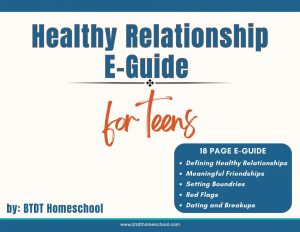

045.
High School Socialization, Friendships, and Dating
This is the 8th Episode in our
High School Series
* How much time should my high schooler spend with friends?
* What can I do to help my high schooler develop meaningful friendships
* Should my high schooler date?
Tune in today as we answer these questions and more!

Episode 045:
Click PLAY Button Above ^^ to listen on our website or listen on your favorite podcast platform:

Scroll down for this week’s FREEBIES:
Healthy Relationship E-Guide for Teens (pdf)
Extracurricular Workbook (pdf)
Brand New to Homeschooling?
GETTING START PAGE >>
Kindergarten Page >>
High School Series >>
Show Notes
Socialization, friendships, and dating are such important roles in the holistic development of high schoolers, and this holds true for homeschooled students just as much as their traditionally schooled peers. During the teen years, friendships become even more important as our children are growing in their understanding of the world and where they fit in it. Recognizing the significance of nurturing meaningful friendships and exploring healthy dating relationships can empower homeschooled high schoolers to build vital life skills, emotional resilience, and a strong sense of identity as they transition into adulthood.

November 2014 vs. August 2023
These socialization aspects of teenage life are not merely about having fun and passing the time; they are essential for emotional, social, and psychological growth. While homeschooling provides many advantages, such as personalized education and flexible schedules, it can sometimes present challenges when it comes to social interaction. But we need not fear that our teens will be “limited” socially by being schooled at home during these years. That is short-range thinking. The social possibilities for homeschoolers are endless, really. All it takes is a bit of creativity and willingness to make it happen.
How much time should my high schooler spend with friends? (6:12)
The amount of time your high schooler should spend with friends can vary greatly depending on their individual personality, needs, and commitments. Not every child has the same need for interactions. And the same goes for parents. If you are an introvert and your child is not, you are going to have to make some effort to facilitate social interactions for your child. That may mean stepping way out of your comfort zone!
Family Dynamics
Also, consider your family dynamic. If you have more than one child, or those of varying ages and interests, this sometimes requires some massive scheduling on your part. Likewise, don’t forget the importance of family time. It’s essential for your child to maintain a connection with the family unit. Consider setting aside specific times for family activities and bonding.
I have been a fan of The Chicken Soup Series forever. I love that they made a teen version. Being a teen is hard – and this book makes them feel like they are not alone. This book is filled with stories that will make you laugh and make you cry. It will act as a best friend, keep you company, motivate you, and reassure you that other teenagers have been through the same ups and downs and have come out okay.
Chicken Soup for the Teenage Soul

Academic Responsibilities
High school students will have academic responsibilities that should be a priority, especially if they are college bound. Encourage your teen to establish a balance between schoolwork and socializing. Luckily, as homeschoolers, we do have the flexibility of setting our own schedules, so social activities don’t have to be limited to weekends or evenings.
Extracurricular Activities
If your child is involved in extracurricular activities such as sports, clubs, theater, or music groups, they may naturally spend more time with friends during these activities. This is beneficial as it combines socializing with personal interests and skill development. Socialization needs will vary from kid to kid, and as your child gets older, they may naturally want more independence and private time with friends, outside of these activities. It’s essential to strike a balance between allowing them this independence and ensuring they still meet their responsibilities and obligations at home and school.
Open Communication
You really want to make sure you maintain open communication with your high schooler about their social life. Encourage them to share their plans and needs with you and be willing to listen if they have concerns or questions about how much time they should spend or want to spend with friends. There are definitely times when we feel over scheduled and over socialized, and we had to dial everything back in and then there were times where we felt the opposite.
Opposing Schedules
High school gets tricky because a lot of kids have fine-tuned their interests, everyone is going different directions, and doing different times of schooling or classes, and sometimes you may even stop seeing some of your best friends due to opposite schedules and activities, or if they’ve chosen to go to public school at this point. When that’s been the case, we have always encouraged our kids to try to schedule times to hang out with those friends and to open the door to new friendships. That happens to everyone – even us as adults. Friendships come in and out of our lives. Gone are the days of easy park days where you just show up. Sometimes you really have to make an effort to plan things and stay on top of schedules to ensure it happens. If you kids can’t or don’t want to do that, you may have to!
Healthy Relationships
You really want to ensure that the time spent with friends is healthy and positive. Know the company your child keeps, and discuss any concerns you may have regarding peer pressure, negative influences, or unsafe behaviors. Take an active role in meeting their friends and chatting with them – and their parents. Keep an open dialogue with your kids. They’re starting to branch out and spend less time with family and more with friends. One of my favorite things about homeschooling is establishing a strong bond from a young age, so that we always have an open dialogue. You want your children to feel safe telling you things.
It’s also more important for your high schooler to have a few close, meaningful friendships than to be constantly surrounded by friends. Encourage them to focus on nurturing these deep connections. We always try to stress quality over quantity.
Safety and Setting Boundaries
You also need to make sure your child understands the importance of safety and setting boundaries in their social interactions, both online and offline. Teach them to make responsible decisions about where and with whom they spend their time. This is especially important for kids who spend a lot of time online. We try to talk a lot about not oversharing information, being cautious of potential scammers and fake people, and just guarding your online interactions, in general. We have a responsibility to teach our kids to think critically. Teaching them online safety can sometimes be especially hard for us because our kids usually know way more about tech and online things than we do! So do your best to stay current so that you can discuss this stuff with your kids.
Overall Well-Being
Pay attention to your child’s well-being. If they seem overwhelmed, stressed, or exhausted from socializing, it might be a sign that they need to scale back and prioritize self-care. Talk to your kids about stress management – nutrition, hydration, healthy sleep habits. If they seem lonely, down, or moody, you definitely want to address that and do what you can do to help them-some of these highs and lows are completely normal with teenagers as they feel all the feels. But pay attention when things seem off more than normal. Even though they are older, they often need guidance navigating relationships and activities.
If your teen is new to homeschooling and maybe came out of a difficult school situation due to bullying or negative social interaction, this is even more important and can be a huge adjustment. Keep trying and do what you can to assist.
Different Needs
Lastly, remember that every teenager is different. Some may be more introverted and prefer less social interaction, while others may be extroverted and thrive on frequent social contact. Respect your child’s personality and adjust expectations accordingly. Again, this is one of the many advantages to homeschooling, that we can customize our approach to socializing just like we can with academics. Ultimately, the amount of time your high schooler spends with friends should align with their personal needs and interests. It’s important to maintain a healthy balance between socialization, academics, extracurricular activities, and family time while allowing your child to develop the social skills and connections that are so important for their well-being.
What can I do to help my high schooler develop meaningful friendships? (16:24)
Helping your high schooler develop meaningful friendships is important for their social and emotional development. But where do you even begin finding friends and developing these relationships? Like we mentioned before, high school can get tricky even if you aren’t new to homeschooling because kids tend to split at this age- their interests are more fine-tuned, they may be involved more heavily into other groups and activities, and their time is precious, too.
Look for local homeschooling groups or co-ops where your high schooler can meet other homeschooled students. These groups often organize activities, classes, and events that provide opportunities for social interaction. Even if you have been involved in a group for a long time, you may want to consider branching out to other groups and seeing what else is out there. We belong to a lot of groups and they all have a different dynamic and vibe, and bring something else to the table.
Encourage your child to participate in extracurricular activities such as sports teams, music groups, art classes, and community service clubs. Not only are these essential for just being a well-rounded person, but these activities can also help them meet like-minded peers who share their interests.
In today’s digital age, online friendships can be just as meaningful as in-person ones. A lot of parents who really limit online interaction and are very strict about kids not having phones, social media, etc. While you do want to make sure your child is protected, technology is our future and kids are going to find their way to it eventually- with or without your blessing. Ensure your child has access to safe online communities, forums, or social media groups where they can connect with other homeschoolers or friends who share their hobbies and interests.
One service that I’ve used for years is called QUSTODIO. When my kids first got devices around middle school age, I really struggled with online safety and protection, and I eventually found this great tool that allows me to monitor apps and websites from my phone. I can even see what websites they visit and block sites from my phone! As they’ve gotten older, I’ve dialed back the monitoring as they have learned online safety but if you’re struggling with this, I would highly recommend this.

Learn more about Qustodio>>
Engaging in volunteer work is another great opportunity. It not only allows your child to give back to the community but also offers more chances to meet people who share their passion for making a difference. We also really like scouts for this. It’s great for kids who want organized opportunities with a lot of fun and group activities.
Look for local classes or workshops related to your child’s interests or hobbies. This can be anything from dance classes to coding workshops. These environments often foster social interaction. Your local recreation center is a great source for this, as well as your local libraries. Library classes and activities are typically free even if you don’t have a card and a lot have reciprocal programs with neighboring city libraries, too.
If your child is old enough, a part-time job can be an excellent way to meet new people. Working with peers can help develop social skills and build friendships. Sometimes these are great learning opportunities to help your kid figure out what they want to do- and what they don’t want to do!
One challenge for homeschoolers that do dual credit, is that their on-campus peers are often a lot older than they are. While we are ok with them swapping numbers or meeting up on campus after class for study related things, we do let our kids know that they need to be upfront about the fact that they can’t really socialize with them outside of class.
Make sure your child has the necessary social skills to build and maintain friendships. Teach them effective communication, active listening, empathy, and conflict resolution. And while it’s important to support your child in building friendships, it’s also crucial to respect their autonomy. Allow them to choose their friends and give them space to develop these relationships, while still talking often about positive interactions and safety. This can be hard for some parents! Just do your best to keep communication lines open with your child. Encourage them to talk about their feelings, experiences, and any challenges they may be facing in the process of making friends.
This is a bit older but still a relevant and helpful resource for parenting in our “Tech World”. In iRules, Hofmann provides families with the tools they need to find a balance between technology and human interaction through a philosophy she calls Slow Tech Parenting. In the book, she educates parents about the online culture tweens and teens enter the minute they go online, exploring issues like cyberbullying, friend fail, and sexting, as well as helping parents create their own iRules contracts to fit their families’ needs.
iRules: What Every Tech-Healthy Family Needs to Know about Selfies, Sexting, Gaming, and Growing up

Building meaningful friendships can take time, so be patient and don’t push your child too hard. It’s normal for the process to have its ups and downs. And when you’re a teenager, these shifts can sometimes feel very extreme from happy to sad. Like we mentioned earlier, the quality of friendships is more important than the quantity. Encourage them to focus on building deep, meaningful connections with a few individuals rather than trying to be friends with everyone. Building friendships is a skill that takes time and practice, so continue to provide support and guidance.
Should my high schooler date? (24:46)
Deciding whether or not your high schooler should date is a personal and often complex decision that depends on various factors, including your child’s maturity level, values, and your family’s beliefs and guidelines.
You really need to assess their emotional and social maturity. Are they capable of handling the responsibilities and potential challenges that come with dating Like communication, compromise, and understanding boundaries? I would encourage you to sit down and have an open and honest conversation about dating. Ask them about their thoughts and feelings regarding dating and really listen to them. In a couple of years, they’ll be young adults and they’re going to be off doing their thing without consulting you, so use this time to help them and influence them in a positive way. As your teen grows, you can be there to help them work through different situations or challenges. Talking to them about relationships and consent will help them understand how to take care of themselves and others. Remember that your child may not always feel like talking or opening up. Be patient and make sure they know they can speak to you about anything.
Mentioning consent always makes me laugh thinking about Sheldon and Amy’s relationship agreement in The Big Bang Theory. It’s so funny when he draws up the contract about when they can and can’t hold hands. Or that short video about tea and consent (*warning F-Bomb) when somebody changes their mind about having tea.
Give your child some examples of healthy and unhealthy behaviors – watch these videos with them. They are humorous, but it’s a serious topic that needs to be addressed. Chat with them about how consent comes across in words and body language. If someone seems uncomfortable with something or says no, it’s important to listen.
Discuss with them what a healthy relationship is. It’s when both people are:
- Caring
- Considerate
- Kind
- Encouraging
You want to teach them about red flags in a relationship like:
- Controlling
- Isolating the other person (they might discourage them from seeing friends)
- Passive-aggressive or unkind
- Self-centered, not considering the other’s needs.
Talk to your child about respect. Speak about gender equality and spotting sexual harassment It’s our job to educate our kids well beyond academics. These are conversations that should be happening from when they were young, but if they weren’t, start today. This goes well beyond dating. These are things that teach them about respecting others and themselves. Be sure to get your FREE Healthy Relationship E-Guide>>
Be aware of potential peer pressure or external influences that might be motivating your child to date. Encourage them to make decisions based on their own feelings and values, not solely to fit in or meet others’ expectations. This is another positive of homeschooling. Many homeschooled kids haven’t really had to succumb to peer pressure. From early on, they were encouraged to have a voice and be heard, and that carries through not only in their teen years, but for the rest of their lives.
Consider your family’s values and beliefs regarding dating and relationships. Different families have different approaches, and it’s important to align your decision on dating rules with your family’s values. Model healthy relationships and communication within your own family. Your child will learn a lot about relationships by observing how you and your partner interact.
Sometimes, focusing on building strong friendships during high school can be a more suitable approach for teenagers who are not yet ready for dating. But if you decide to allow dating, set age-appropriate boundaries and rules. Depending on your child’s age and your comfort level, you might choose to supervise their early dating experiences more closely. These could include curfews, group dates, and guidelines for physical affection. Or no closed doors when in bedrooms, and not being at someone’s house when parents aren’t home. As they demonstrate responsibility and maturity, you can grant more independence. Be clear about your expectations.
Ultimately, the decision to allow your high schooler to date should be based on their individual readiness and your family’s values. Keep in mind that every teenager is different, and what works for one may not work for another. Emphasize the importance of maintaining a balance between dating, academics, extracurricular activities, and family commitments. Ensure that dating doesn’t interfere with their responsibilities. It’s crucial to maintain open communication with your child, listen to their concerns, and provide guidance and support as they navigate the complexities of dating and relationships.
This Week’s Freebies:


We created this group as a way to share FREE resources all over the world with NO SPAM:

Show Notes
If you’re brand-new to homeschooling, be sure to visit our GETTING STARTED Page
This is the 8th Episode in our
HIGH SCHOOL SERIES
Socialization, friendships, and dating are such important roles in the holistic development of high schoolers, and this holds true for homeschooled students just as much as their traditionally schooled peers. During the teen years, friendships become even more important as our children are growing in their understanding of the world and where they fit in it. Recognizing the significance of nurturing meaningful friendships and exploring healthy dating relationships can empower homeschooled high schoolers to build vital life skills, emotional resilience, and a strong sense of identity as they transition into adulthood.

November 2014 vs. August 2023
These socialization aspects of teenage life are not merely about having fun and passing the time; they are essential for emotional, social, and psychological growth. While homeschooling provides many advantages, such as personalized education and flexible schedules, it can sometimes present challenges when it comes to social interaction. But we need not fear that our teens will be “limited” socially by being schooled at home during these years. That is short-range thinking. The social possibilities for homeschoolers are endless, really. All it takes is a bit of creativity and willingness to make it happen.
How much time should my high schooler spend with friends? (6:12)
The amount of time your high schooler should spend with friends can vary greatly depending on their individual personality, needs, and commitments. Not every child has the same need for interactions. And the same goes for parents. If you are an introvert and your child is not, you are going to have to make some effort to facilitate social interactions for your child. That may mean stepping way out of your comfort zone!
Family Dynamics
Also, consider your family dynamic. If you have more than one child, or those of varying ages and interests, this sometimes requires some massive scheduling on your part. Likewise, don’t forget the importance of family time. It’s essential for your child to maintain a connection with the family unit. Consider setting aside specific times for family activities and bonding.
I have been a fan of The Chicken Soup Series forever. I love that they made a teen version. Being a teen is hard – and this book makes them feel like they are not alone. This book is filled with stories that will make you laugh and make you cry. It will act as a best friend, keep you company, motivate you, and reassure you that other teenagers have been through the same ups and downs and have come out okay.
Chicken Soup for the Teenage Soul

Academic Responsibilities
High school students will have academic responsibilities that should be a priority, especially if they are college bound. Encourage your teen to establish a balance between schoolwork and socializing. Luckily, as homeschoolers, we do have the flexibility of setting our own schedules, so social activities don’t have to be limited to weekends or evenings.
Extracurricular Activities
If your child is involved in extracurricular activities such as sports, clubs, theater, or music groups, they may naturally spend more time with friends during these activities. This is beneficial as it combines socializing with personal interests and skill development. Socialization needs will vary from kid to kid, and as your child gets older, they may naturally want more independence and private time with friends, outside of these activities. It’s essential to strike a balance between allowing them this independence and ensuring they still meet their responsibilities and obligations at home and school.

Open Communication
You really want to make sure you maintain open communication with your high schooler about their social life. Encourage them to share their plans and needs with you and be willing to listen if they have concerns or questions about how much time they should spend or want to spend with friends. There are definitely times when we feel over scheduled and over socialized, and we had to dial everything back in and then there were times where we felt the opposite.
Opposing Schedules
High school gets tricky because a lot of kids have fine-tuned their interests, everyone is going different directions, and doing different times of schooling or classes, and sometimes you may even stop seeing some of your best friends due to opposite schedules and activities, or if they’ve chosen to go to public school at this point. When that’s been the case, we have always encouraged our kids to try to schedule times to hang out with those friends and to open the door to new friendships. That happens to everyone – even us as adults. Friendships come in and out of our lives. Gone are the days of easy park days where you just show up. Sometimes you really have to make an effort to plan things and stay on top of schedules to ensure it happens. If you kids can’t or don’t want to do that, you may have to!
Healthy Relationships
You really want to ensure that the time spent with friends is healthy and positive. Know the company your child keeps, and discuss any concerns you may have regarding peer pressure, negative influences, or unsafe behaviors. Take an active role in meeting their friends and chatting with them – and their parents. Keep an open dialogue with your kids. They’re starting to branch out and spend less time with family and more with friends. One of my favorite things about homeschooling is establishing a strong bond from a young age, so that we always have an open dialogue. You want your children to feel safe telling you things.
Get your FREE Teen Healthy Relationship E-Guide. Learn strategies to help your teenager find meaningful friendships, navigate dating, learn how to set boundaries and spot red flags, and empower them with skills to form deep connections:

It’s also more important for your high schooler to have a few close, meaningful friendships than to be constantly surrounded by friends. Encourage them to focus on nurturing these deep connections. We always try to stress quality over quantity.
Safety and Setting Boundaries
You also need to make sure your child understands the importance of safety and setting boundaries in their social interactions, both online and offline. Teach them to make responsible decisions about where and with whom they spend their time. This is especially important for kids who spend a lot of time online. We try to talk a lot about not oversharing information, being cautious of potential scammers and fake people, and just guarding your online interactions, in general. We have a responsibility to teach our kids to think critically. Teaching them online safety can sometimes be especially hard for us because our kids usually know way more about tech and online things than we do! So do your best to stay current so that you can discuss this stuff with your kids.
Overall Well-Being
Pay attention to your child’s well-being. If they seem overwhelmed, stressed, or exhausted from socializing, it might be a sign that they need to scale back and prioritize self-care. Talk to your kids about stress management – nutrition, hydration, healthy sleep habits. If they seem lonely, down, or moody, you definitely want to address that and do what you can do to help them-some of these highs and lows are completely normal with teenagers as they feel all the feels. But pay attention when things seem off more than normal. Even though they are older, they often need guidance navigating relationships and activities.
If your teen is new to homeschooling and maybe came out of a difficult school situation due to bullying or negative social interaction, this is even more important and can be a huge adjustment. Keep trying and do what you can to assist.
Different Needs
Lastly, remember that every teenager is different. Some may be more introverted and prefer less social interaction, while others may be extroverted and thrive on frequent social contact. Respect your child’s personality and adjust expectations accordingly. Again, this is one of the many advantages to homeschooling, that we can customize our approach to socializing just like we can with academics. Ultimately, the amount of time your high schooler spends with friends should align with their personal needs and interests. It’s important to maintain a healthy balance between socialization, academics, extracurricular activities, and family time while allowing your child to develop the social skills and connections that are so important for their well-being.
What can I do to help my high schooler develop meaningful friendships? (16:24)
Helping your high schooler develop meaningful friendships is important for their social and emotional development. But where do you even begin finding friends and developing these relationships? Like we mentioned before, high school can get tricky even if you aren’t new to homeschooling because kids tend to split at this age- their interests are more fine-tuned, they may be involved more heavily into other groups and activities, and their time is precious, too.
Look for local homeschooling groups or co-ops where your high schooler can meet other homeschooled students. These groups often organize activities, classes, and events that provide opportunities for social interaction. Even if you have been involved in a group for a long time, you may want to consider branching out to other groups and seeing what else is out there. We belong to a lot of groups and they all have a different dynamic and vibe, and bring something else to the table.
Encourage your child to participate in extracurricular activities such as sports teams, music groups, art classes, and community service clubs. Not only are these essential for just being a well-rounded person, but these activities can also help them meet like-minded peers who share their interests.
In today’s digital age, online friendships can be just as meaningful as in-person ones. A lot of parents who really limit online interaction and are very strict about kids not having phones, social media, etc. While you do want to make sure your child is protected, technology is our future and kids are going to find their way to it eventually- with or without your blessing. Ensure your child has access to safe online communities, forums, or social media groups where they can connect with other homeschoolers or friends who share their hobbies and interests.
One service that I’ve used for years is called QUSTODIO. When my kids first got devices around middle school age, I really struggled with online safety and protection, and I eventually found this great tool that allows me to monitor apps and websites from my phone. I can even see what websites they visit and block sites from my phone! As they’ve gotten older, I’ve dialed back the monitoring as they have learned online safety but if you’re struggling with this, I would highly recommend this.

Learn more about Qustodio>>
Engaging in volunteer work is another great opportunity. It not only allows your child to give back to the community but also offers more chances to meet people who share their passion for making a difference. We also really like scouts for this. It’s great for kids who want organized opportunities with a lot of fun and group activities.
Look for local classes or workshops related to your child’s interests or hobbies. This can be anything from dance classes to coding workshops. These environments often foster social interaction. Your local recreation center is a great source for this, as well as your local libraries. Library classes and activities are typically free even if you don’t have a card and a lot have reciprocal programs with neighboring city libraries, too.
If your child is old enough, a part-time job can be an excellent way to meet new people. Working with peers can help develop social skills and build friendships. Sometimes these are great learning opportunities to help your kid figure out what they want to do- and what they don’t want to do!
One challenge for homeschoolers that do dual credit, is that their on-campus peers are often a lot older than they are. While we are ok with them swapping numbers or meeting up on campus after class for study related things, we do let our kids know that they need to be upfront about the fact that they can’t really socialize with them outside of class.
Make sure your child has the necessary social skills to build and maintain friendships. Teach them effective communication, active listening, empathy, and conflict resolution. And while it’s important to support your child in building friendships, it’s also crucial to respect their autonomy. Allow them to choose their friends and give them space to develop these relationships, while still talking often about positive interactions and safety. This can be hard for some parents! Just do your best to keep communication lines open with your child. Encourage them to talk about their feelings, experiences, and any challenges they may be facing in the process of making friends.
This is a bit older but still a relevant and helpful resource for parenting in our “Tech World”. In iRules, Hofmann provides families with the tools they need to find a balance between technology and human interaction through a philosophy she calls Slow Tech Parenting. In the book, she educates parents about the online culture tweens and teens enter the minute they go online, exploring issues like cyberbullying, friend fail, and sexting, as well as helping parents create their own iRules contracts to fit their families’ needs.
iRules: What Every Tech-Healthy Family Needs to Know about Selfies, Sexting, Gaming, and Growing up

Building meaningful friendships can take time, so be patient and don’t push your child too hard. It’s normal for the process to have its ups and downs. And when you’re a teenager, these shifts can sometimes feel very extreme from happy to sad. Like we mentioned earlier, the quality of friendships is more important than the quantity. Encourage them to focus on building deep, meaningful connections with a few individuals rather than trying to be friends with everyone. Building friendships is a skill that takes time and practice, so continue to provide support and guidance.
Should my high schooler date? (24:46)
Deciding whether or not your high schooler should date is a personal and often complex decision that depends on various factors, including your child’s maturity level, values, and your family’s beliefs and guidelines.
You really need to assess their emotional and social maturity. Are they capable of handling the responsibilities and potential challenges that come with dating Like communication, compromise, and understanding boundaries? I would encourage you to sit down and have an open and honest conversation about dating. Ask them about their thoughts and feelings regarding dating and really listen to them. In a couple of years, they’ll be young adults and they’re going to be off doing their thing without consulting you, so use this time to help them and influence them in a positive way. As your teen grows, you can be there to help them work through different situations or challenges. Talking to them about relationships and consent will help them understand how to take care of themselves and others. Remember that your child may not always feel like talking or opening up. Be patient and make sure they know they can speak to you about anything.
Mentioning consent always makes me laugh thinking about Sheldon and Amy’s relationship agreement in The Big Bang Theory. It’s so funny when he draws up the contract about when they can and can’t hold hands. Or that short video about tea and consent (*warning F-Bomb) when somebody changes their mind about having tea.
Give your child some examples of healthy and unhealthy behaviors – watch these videos with them. They are humorous, but it’s a serious topic that needs to be addressed. Chat with them about how consent comes across in words and body language. If someone seems uncomfortable with something or says no, it’s important to listen.
Discuss with them what a healthy relationship is. It’s when both people are:
- Caring
- Considerate
- Kind
- Encouraging
You want to teach them about red flags in a relationship like:
- Controlling
- Isolating the other person (they might discourage them from seeing friends)
- Passive-aggressive or unkind
- Self-centered, not considering the other’s needs.
Talk to your child about respect. Speak about gender equality and spotting sexual harassment It’s our job to educate our kids well beyond academics. These are conversations that should be happening from when they were young, but if they weren’t, start today. This goes well beyond dating. These are things that teach them about respecting others and themselves. Be sure to get your FREE Healthy Relationship E-Guide>>
Be aware of potential peer pressure or external influences that might be motivating your child to date. Encourage them to make decisions based on their own feelings and values, not solely to fit in or meet others’ expectations. This is another positive of homeschooling. Many homeschooled kids haven’t really had to succumb to peer pressure. From early on, they were encouraged to have a voice and be heard, and that carries through not only in their teen years, but for the rest of their lives.
Consider your family’s values and beliefs regarding dating and relationships. Different families have different approaches, and it’s important to align your decision on dating rules with your family’s values. Model healthy relationships and communication within your own family. Your child will learn a lot about relationships by observing how you and your partner interact.
Sometimes, focusing on building strong friendships during high school can be a more suitable approach for teenagers who are not yet ready for dating. But if you decide to allow dating, set age-appropriate boundaries and rules. Depending on your child’s age and your comfort level, you might choose to supervise their early dating experiences more closely. These could include curfews, group dates, and guidelines for physical affection. Or no closed doors when in bedrooms, and not being at someone’s house when parents aren’t home. As they demonstrate responsibility and maturity, you can grant more independence. Be clear about your expectations.
Ultimately, the decision to allow your high schooler to date should be based on their individual readiness and your family’s values. Keep in mind that every teenager is different, and what works for one may not work for another. Emphasize the importance of maintaining a balance between dating, academics, extracurricular activities, and family commitments. Ensure that dating doesn’t interfere with their responsibilities. It’s crucial to maintain open communication with your child, listen to their concerns, and provide guidance and support as they navigate the complexities of dating and relationships.
We created this group as a way to share FREE resources all over the world with NO SPAM:

Freebie
Get your FREE Teen Healthy Relationship E-Guide. Learn strategies to help your teenager find meaningful friendships, navigate dating, learn how to set boundaries and spot red flags, and empower them with skills to form deep connections:


Lorem ipsum dolor sit amet, consectetur adipiscing elit. Ut elit tellus, luctus nec ullamcorper mattis, pulvinar dapibus leo.
Lorem ipsum dolor sit amet, consectetur adipiscing elit. Ut elit tellus, luctus nec ullamcorper mattis, pulvinar dapibus leo.
Lorem ipsum dolor sit amet, consectetur adipiscing elit. Ut elit tellus, luctus nec ullamcorper mattis, pulvinar dapibus leo.
Lorem ipsum dolor sit amet, consectetur adipiscing elit. Ut elit tellus, luctus nec ullamcorper mattis, pulvinar dapibus leo.
Lorem ipsum dolor sit amet, consectetur adipiscing elit. Ut elit tellus, luctus nec ullamcorper mattis, pulvinar dapibus leo.




